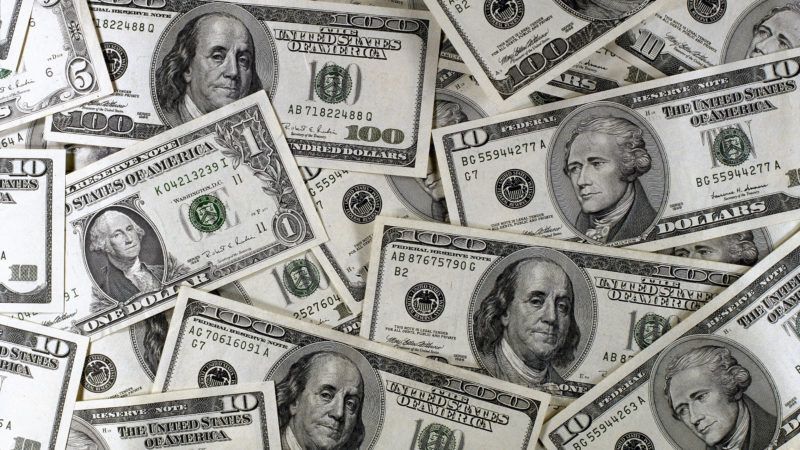After the Stimulus Binge, Brace for a Crash
Skyrocketing debt, higher borrowing costs, and a hobbled economy are predicted in the latest Congressional Budget Office report.

As anybody who has ever snorted a few lines of white powder to enhance an evening knows, there is a price to be paid for that artificial energy. The short-term boost is followed by a crash of longer duration. Well, America, get ready for a hell of a hangover. According to the Congressional Budget Office (CBO), the federal government's recent stimulus spending—intended to offset the economic distress caused by voluntary social distancing and, especially, by mandatory lockdowns—is bound to be followed by an epic crash.
In a report published September 18, the CBO looks at the impact of four federal laws that are supposed to reduce the pain of social distancing as well as forced business closures and resulting job losses: the Coronavirus Preparedness and Response Supplemental Appropriations Act of 2020; the Families First Coronavirus Response Act; the Coronavirus Aid, Relief, and Economic Security (CARES) Act; and the Paycheck Protection Program and Health Care Enhancement Act. Those laws increased funding for federal agencies and for state and local governments, in addition to requiring employers to grant paid sick leave to employees, providing payments and tax credits to businesses and individuals, and offering loans and payments to businesses and health care providers to help keep them operating.
The idea was to keep America coasting as manufacturing, buying, and selling were sharply curtailed. But simulating economic prosperity in the absence of an economy is an expensive proposition.
Here's how the CBO characterizes these stimulus laws' effects on the U.S. economy:
Short-Term Effects. CBO estimates that the legislation will increase the level of real (inflation-adjusted) gross domestic product (GDP) by 4.7 percent in 2020 and 3.1 percent in 2021. From fiscal year 2020 through 2023, for every dollar that it adds to the deficit, the legislation is projected to increase GDP by about 59 cents.
Longer-Term Effects. By increasing debt as a percentage of GDP, the legislation is expected to raise borrowing costs, lower economic output, and reduce national income in the longer term.
The cost of this artificial boost—4.7 percent to GDP in 2020 and 3.1 percent in 2021—is $2.9 trillion in deficit spending over the same period, notes the CBO. The pandemic will pass, but we'll be paying for government actions taken during this time for many years to come.
How much will we pay? "Federal budget deficits raise the ratio of federal debt to GDP from 79 percent in 2019 to 109 percent in 2030," the CBO projects.
The growth of government debt to exceed the size of the entire economy for the first time since World War II was separately projected by the CBO earlier this month and is reiterated in the latest report.
In fact, deficits and debt may be worse than this report suggests. The CBO admitted in August that it tends to slightly overestimate government revenues. Lower revenues than anticipated will mean higher deficits unless government spending is reduced (don't hold your breath). That adds up to higher debt pretty quickly.
Nothing in the CBO report is really a surprise, since experts all along have been pointing out that we'll be paying for 2020's spending binge for many years to come.
"All this needed borrowing will obviously have a profound consequence on the national debt," Maya MacGuineas, president of the bipartisan Committee for a Responsible Federal Budget and a supporter of federal stimulus spending, cautioned during July testimony before the Senate Homeland Security and Government Affairs Committee. "In the short run, borrowing is exactly what we need to be doing; in the longer-run, the debt accumulation will have to be dealt with."
"Unnecessary borrowing will just make it that much more difficult to get the national debt under control and stabilize our fiscal and economic future once this crisis has passed," MacGuineas added.
Other commenters have been more ambivalent, at best, about the wisdom of the stimulus packages.
"The increases in federal expenditures and the reduction in government revenue are being financed almost exclusively by borrowing and will push the federal debt to $30 trillion sometime during 2021," warned James D. Gwartney, a professor of economics and policy sciences at Florida State University. "Interest rates will inevitably rise at some point, and the additional interest cost will have to be covered by either higher taxes or money creation. The former will slow future economic growth, while the latter will be inflationary."
The CBO obviously agrees that government debt is unlikely to be under control anytime soon and that economic output is likely to suffer. The recent report also notes that "higher debt—coming at a time when the longer-term path for debt was already high—could eventually increase the risk of a fiscal crisis or of less abrupt economic changes, such as higher inflation or the undermining of the U.S. dollar's predominant role in global financial markets."
That's pretty gloomy stuff. But given years of cautionary language about debts and spending from the CBO, it may not even register on a jaded public. Among those paying attention, nasty economic consequences from rising deficits and debt were expected years before the pandemic and policy responses to the virus imposed new costs. How much more can people be expected to fret about a federal government that has long been addicted to spending far beyond its means?
The latest spending binge was irresistible for elected officials who need slight excuse for their compulsive behavior. "Airlifting cash into American households is one of those rare concepts that almost every politician can embrace," Michael Grunwald commented at Politico back when pandemic stimulus schemes were first floated.
It's a special occasion. What harm could one more line do, anyway?
America got its short-term boost from stimulus checks. We'll have plenty of opportunity to decide in the years to come whether it was worth the inevitable comedown.


Show Comments (124)